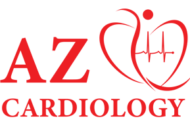Get back to your active lifestyle with our comprehensive cardiac care
Congestive heart failure (CHF) is a serious condition that affects millions of Americans every year. It occurs when the heart is unable to pump blood effectively, causing symptoms such as shortness of breath, fatigue, and swelling in the legs and ankles.
At AZ Cardiology, we offer advanced treatment options for CHF patients that can help manage symptoms, improve quality of life, and reduce the risk of complications.

What is Congestive Heart Failure (CHF)?
Congestive heart failure (CHF) is a medical condition in which the heart is unable to pump enough blood to meet the body’s needs. CHF occurs when the heart muscle is damaged or weakened, and it can affect either the right or left side of the heart.
When the left side of the heart is affected, the condition is called left-sided heart failure. This can cause fluid to back up into the lungs, leading to symptoms such as shortness of breath, coughing, and fatigue. When the right side of the heart is affected, the condition is called right-sided heart failure. This can cause fluid to build up in the legs, abdomen, and other parts of the body, leading to symptoms such as swelling and weight gain.
What are the causes of CHF?
Congestive heart failure (CHF) can be caused by various underlying conditions that damage or weaken the heart muscle. Some common causes of CHF include:
- Coronary artery disease: A condition where the arteries that supply blood to the heart become narrow or blocked, reducing blood flow and oxygen to the heart muscle.
- High blood pressure: Prolonged high blood pressure can cause the heart to work harder than it should, leading to thickening and stiffness of the heart muscle.
- Heart attack: A heart attack occurs when a blockage in the coronary artery causes a portion of the heart muscle to die, reducing the heart’s ability to pump blood effectively.
- Cardiomyopathy: A disease of the heart muscle that can lead to heart failure. This can be caused by infections, genetic factors, or long-term alcohol abuse.
- Heart valve disease: Damage to the heart valves due to infections, rheumatic fever, or other conditions can cause the heart to work harder and lead to heart failure.
- Arrhythmias: Abnormal heart rhythms can weaken the heart muscle over time and lead to heart failure.
- Diabetes: Diabetes can cause damage to the blood vessels and nerves that supply the heart, increasing the risk of heart failure.
- Obesity: Obesity can lead to conditions such as high blood pressure, diabetes, and sleep apnea, which can increase the risk of heart failure.
- Lung diseases: Chronic lung diseases such as emphysema and pulmonary fibrosis can increase the workload on the heart and lead to heart failure.
What are the symptoms of congestive heart failure?
Early diagnosis and treatment of CHF can improve outcomes and quality of life. It’s important to recognize the signs and symptoms of CHF to get timely medical care. Here are the common symptoms of CHF:
- Shortness of Breath: Difficulty breathing or shortness of breath, especially during physical activity or while lying down.
- Fatigue: Feeling tired or weak, even after getting enough rest.
- Swelling: Swelling in the legs, ankles, feet, or abdomen due to fluid buildup.
- Rapid Heartbeat: Irregular or rapid heartbeat, palpitations, or feeling like the heart is fluttering.
- Coughing: Persistent coughing, especially at night or when lying down, due to fluid buildup in the lungs.
- Loss of Appetite: Feeling full or nauseous, loss of appetite, or rapid weight gain due to fluid retention.
- Confusion: Difficulty concentrating, memory loss, or feeling disoriented, especially in older adults.
What can be done?
Our team uses the latest diagnostic tools and treatments to develop a personalized treatment plan that addresses your unique needs. Our CHF services include:
- Diagnosis and Evaluation: We use a variety of tests and procedures, such as echocardiography and cardiac catheterization, to accurately diagnose and evaluate your CHF.
- Medication Management: We provide personalized medication management to help control your symptoms and improve your heart function.
- Lifestyle Modification: Our team offers guidance and support for lifestyle modifications such as diet and exercise to help manage your CHF and improve your overall health.
- Device Therapy: We offer implantation of devices such as pacemakers and defibrillators to help regulate your heart rhythm and improve your heart function.
- Cardiac Rehabilitation: Our cardiac rehabilitation program helps you regain your strength and improve your heart health after a CHF diagnosis.
At AZ Cardiology, we are committed to providing the highest level of care for our CHF patients in Arizona. Our team has extensive experience in diagnosing and treating heart failure, and we use the latest technology and techniques to deliver the best possible outcomes.
We understand that living with CHF can be challenging, but we are here to help you every step of the way. Our goal is to help you manage your symptoms, improve your quality of life, and get back to doing the things you love.
Contact us today to schedule a consultation and learn more about our advanced treatment options.

